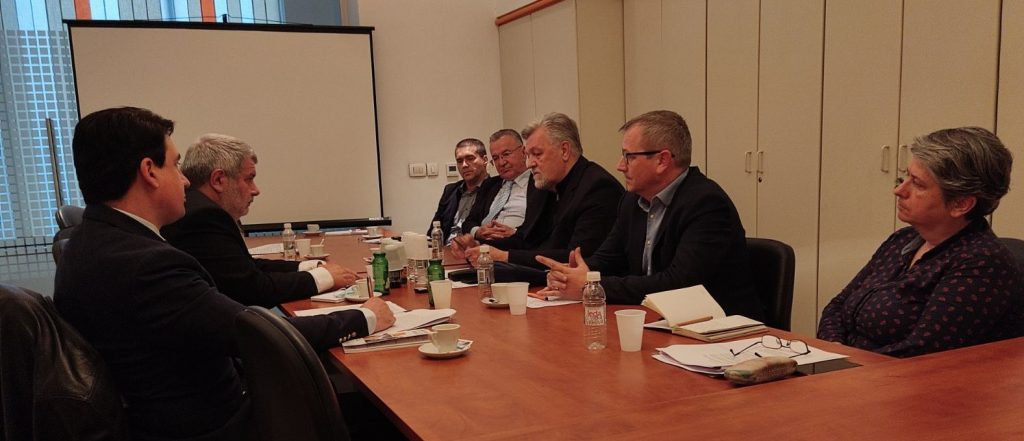
Today in the premises of PARCO, Coordinator for Public Administration Reform in BiH Dragan Ćuzulan, deputy Coordinators Darko Kasap and Ferid Otajagić and their associates held a working-consultative meeting with the Head of the Section for European Integration, Political Affairs, Public Relations and Information in the EU Delegation to BiH Mr. Krassimir Nikolov and his associates, who discussed the delay in adopting key documents in public administration reform, such as the Common Platform on Principles and Manner of Implementing Public Administration Reform in BiH.
On the meeting it was discussed on “Common Platform on the principles and manner of implementation of public administration reform in Bosnia and Herzegovina” which represents a political and legal framework for cooperation of administrative bodies at all levels of government in the process of public administration reform in BiH, but also the implementation of the Strategic Framework for Public Administration Reform and the accompanying Action Plan. Among other things, the document defines the political coordination of public administration reform, ie the establishment of a body – the Coordination Committee for Public Administration Reform. However, there is still no political agreement on who will be part of the Coordination Committee, whether only the chairman of the Council of Ministers of BiH, the Prime ministers of the Entities and the Brčko District of BiH, or the competent Ministers of Justice in BiH.
“Adopting the Common Platform, relaunching the implementation of the Action Plan and managing public finances are three key things that BiH must do as soon as possible if does not want that the pages of BiH’s progress report towards European integration, which are supposed to be published in October this year, are empty.”, said Nikolov and supported the efforts of the management of the PARCO to reach an agreement in the field of public administration reform.
He also added that the governments in BiH must decide on the issue of greater allocations from the budget for public administration reform, which is one of the recommendations from the last session of the Special PAR Group.
Ćuzulan informed Nikolov that in the past period, work has been done on the development of an information system for monitoring and reporting on the implementation of the Strategic Framework for Public Administration Reform in BiH and the accompanying Action Plan. He mentioned the blockade of the PAR Fund and added that the PAR Fund was important for building the confidence of bilateral donors in the public administration reform process in BiH and that the PAR Fund’s role in supporting and promoting a harmonized and coordinated approach to public administration reform was as important as its financial function.
He reminded that the Government of the Federation of BiH adopted the Decision on accepting the Agreement on the expenditure of the remaining funds paid into the PAR Fund. The agreement defines the purpose of spending the remaining funds in the Fund for the implementation of activities envisaged by the Strategic Framework for Public Administration Reform in BiH 2018-2022 and the accompanying Action Plan. The Federal Government and the Government of the Brčko District of BiH also adopted decisions on appointing members and deputy members of supervisory teams for the implementation of public reform, while representatives of supervisory teams were not appointed at the level of the Council of Ministers of BiH nor in Republika Srpska.
Ćuzulan noted that despite this stalemate and the blockade of the PAR Fund, which finances joint projects for all administrative levels, PARCO was committed to cooperating with donors, thanks to whom it enabled the implementation of several projects through bilateral cooperation and those project are of importance for citizens: electronic registration of newborns at the Opća Bolnica Sarajevo, establishment of a one-stop shop system in the Municipality of Center in Sarajevo, online application for a tender conducted by the Civil Service Agency in BiH, establishment of a pilot project of open data – enabling insight into data without requests, etc.
